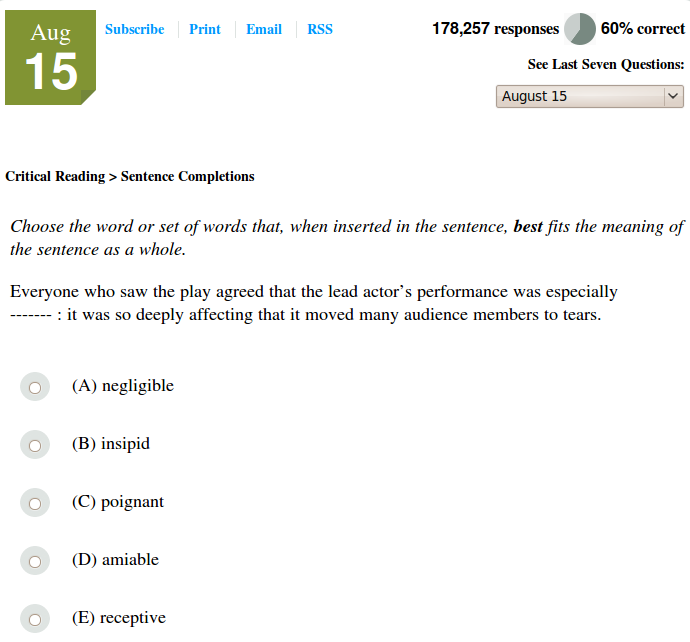Forgive my indignation
« previous post | next post »
There's still no sign of the logically-imminent spamularity. On the contrary, the same tired old spam formulations seem to be endlessly recycled. One that recently slipped past gmail's spam filters into my inbox began
Greetings from Iraq.
Forgive my indignation if this message comes to you as a surprise.
I am SGT. LAURA MCMILLAN, i am presently in Iraq and i have something very important to discouse with you.Please contact me via my private box: XXXXXXX@aol.com
The email header named the sender as Zuzana so-and-so, allegedly sent from the vfn.cz domain, which is Všeobecná fakultní nemocnice v Praze (= "General Teaching Hospital of Prague").
"Forgive my indignation if this message comes to you as a surprise" has been a staple of 419 email scams for years. It's surprising that the spammers are so uninventive, and even more surprising that this message didn't trigger a spam filter.
Update — Mark Anderson in the comments observes that "presumably 'indignation' was originally a mistake for some other word in a well-known (but not to me) phrase"; and Jason asks "what native speaker or even minimally conscious paramecium would think this really was from SGT LAURA MCMILLAN with a red-hot business opportunity?".
At least from the word-usage perspective, Jason should consider what we can learn from the SAT and similar tests: many literate native speakers find it surprisingly difficult to evaluate fancy words in context. Consider the SAT "Question of the Day" for 8/18/2011, which 58,844 of 143,522 people got wrong:
Or the practice question for 8/15/2011:
And according to the COCA corpus, poignant (at about 3.9 per million) is slightly more common than indignation (at about 2.4 per million).


Janice Byer said,
August 18, 2011 @ 8:21 pm
My fear is such letters might've scammed so many that spammers credit the wording.
I once served on a federal grand jury that indicted a Virginia couple later convicted of mail-order consumer fraud – this was before email – using a formula ad in periodicals that invited people to make $$$ at home stuffing envelopes. When sales slacked off, they merely added the line, "This is Not a Scam" and sales picked up. According to fed testimony, at least two prior victims believed them and were ripped off twice :(
Jason said,
August 18, 2011 @ 10:51 pm
Honestly, who the hell replies to this crap? They wouldn't do it if there was absolutely no return, and what native speaker or even minimally conscious paramecium would think this really was from SGT LAURA MCMILLAN with a red-hot business opportunity?
David Donnell said,
August 19, 2011 @ 12:17 am
Jason: a little intermittent reinforcement goes a long way.
Mark Anderson said,
August 19, 2011 @ 2:38 am
Forgive my puzzlement, but presumably "indignation" was originally a mistake for some other word in a well-known (but not to me) phrase. My best guess: indiscretion?
Mark Anderson said,
August 19, 2011 @ 2:53 am
Second guess: importunity. See link to Count of Monte Cristo below.
http://books.google.co.uk/books?id=Fnv4xKC9hxoC&pg=PA382&lpg=PA382&dq=forgive+my+importunity&source=bl&ots=FfLk89O8YJ&sig=7iDzosN7G4KDzdd2vvQmCzVckso&hl=en&ei=PRJOTtuYH4PQhAey9uTdBg&sa=X&oi=book_result&ct=result&resnum=6&sqi=2&ved=0CC4Q6AEwBQ#v=onepage&q=forgive%20my%20importunity&f=false
Thomas said,
August 19, 2011 @ 4:14 am
@Jason: and if it's not targetted at native speakers, but at less-than-fluent non-native readers?
Sid said,
August 19, 2011 @ 7:07 am
On an unrelated note, I must express some indignation over the second SAT question; I get a feeling that many a theater critic would prefer option B to C.
Ellen K. said,
August 19, 2011 @ 7:38 am
Frankly, I didn't even notice "indignation" being the wrong word to use there when I read this post the first time. I did notice the missing space after a period, as well as "to discourse with you" not being something I can imagine any native speaker or well experienced English-user saying. I did not notice, the first time, the failure to capitalize the first person pronoun when not sentence initial. "Discourse" alone is enough to suggest that it's not legit. Also the failure to say how she got the email address. ("She" meaning the mentioned person, if it were actually her.)
[(myl) You also didn't notice that it's "discouse with you" rather than "discourse with you"…]
Peter G. Howland said,
August 19, 2011 @ 7:56 am
And, "discouse with you" could be a phonetic misinterpretation of the spelling of "discuss" (?)
The Ridger said,
August 19, 2011 @ 8:30 am
A large number of people who respond are attracted precisely because the scammer sounds so ignorant. They're the ones who think they'll get over on the writer, not the ones who believe it. The scams hit both kinds of victims, but the ones planning to steal all the money and not settle for the 30% (or whatever) rarely call the cops.
The Ridger said,
August 19, 2011 @ 8:31 am
@Sid: but surely not when coupled with "so deeply affecting"? ;-)
Mr Fnortner said,
August 19, 2011 @ 8:32 am
I thought "indiscretion" would be a better guess at what the original writer penned, but a quick Google search for "Forgive my * if this message comes" turned up 15 hits almost evenly divided between "approach" and "intrusion". What was delightful to find was one instance of "choler" whose meaning is close to the meaning of "indignation". This makes me think that the original was not written in English, and was translated poorly (in the manner of the many interesting Chinese translations examined on LL) many long years ago.
Mark Anderson said,
August 19, 2011 @ 8:41 am
On a similar theme, I recently received a Nigerian-style letter in which I was invited to use my client account to bank some missing millions that had been owned by someone who died in a car crash. The letter sought to reassure me that the deceased had died "interstate". It took me a while to work out that this was not a reference to his travelling between two States (perhaps on an interstate highway) when he died; the author meant to say "intestate".
Malo Juevo said,
August 19, 2011 @ 9:19 am
As somebody who one was involved in hacking into scammers' e-mail accounts and warning their potential victims, I can tell you a few things about how they operate.
Most of the scanners are, if anything, even less sophisticated, savvy, and computer literate than the people they manage to con. It's not particularly difficult for an experienced "scam-baiter" to get the scammer to pay the intended victim (!), as a supposed demonstration of his good faith. Another example is that many successful scams involve multiple scammers ("guymen" is what they call themselves in English). Naturally, the complex transactions they are supposed to be simulating will involve multiple fictional characters, but may of the scammers think that if there are multiple characters e-mailing the mark, there need to be multiple scammers–as if each crook could only play one role!
So the scammers generally cannot recognize what are effective scam e-mails ("da levels") and what are not. Mostly, they just recycle boilerplate they've gotten from other scammers. The first-line scammers ("catchers") also send out so many starting e-mails, using so many different formats, that they often don't even know which of their "levels" elicited a positive response. That obviously makes it very difficult to evaluate which ones work and which don't.
Moreover, the people who fall for these scams are most frequently poorly educated and/or not native speakers of English. They either cannot recognize very poor English skills, or they fail to appreciate that the inability to write prestige English is a sure sign that the authors is not a well-educated banker or barrister.
Of course, these are only generalities. There are many smart, well-educated (and successful) scammers, who know which formats tend to work and which don't. There are also well-educated victims who nonetheless fall from crude scams. I remember talking on the phone to a surgeon who, it turned out, had already lost almost $300,000 before I warned him it was a scam.
Eric P Smith said,
August 19, 2011 @ 9:29 am
Is it possible that the spammer did indeed mean to use the word ‘indignation’ but misunderstood on which party the concept fell? In other words, that he or she meant, “Forgive me if you feel indignant at receiving this message”?
As a child I learned the word ‘snob’ from a comic strip that showed snobbery being shown by one person towards another. I understood the concept straight away, apart from one rather important point: I thought that the word ‘snob’ applied not to the snooty party but to the victim of the snobbery.
Ran Ari-Gur said,
August 19, 2011 @ 10:16 am
@Eric P Smith: That seems very likely to me. As a child, I once had a similar confusion about "adopt" (I thought that adopted children had been "adopted" by their birth parents, and that "adopting" meant what I would now call "giving up for adoption"). Even aside from childish confusions, there are plenty of words that are genuinely ambiguous in this way; people who are vegetarian eat food that is vegetarian. "Macbeth's murders" (subjective genitive) include "Duncan's murder" (objective genitive). (I hope that's not too much of a spoiler.) Emotions in English don't seem to have this ambiguity — I don't think "my anger" ever means "the anger I provoked in someone else" — but I definitely see how a non-native speaker could make the mistake.
a George said,
August 19, 2011 @ 10:17 am
– you mean the victim was snubbed?
Eric P Smith said,
August 19, 2011 @ 12:30 pm
@a George: Yes, quite possibly!